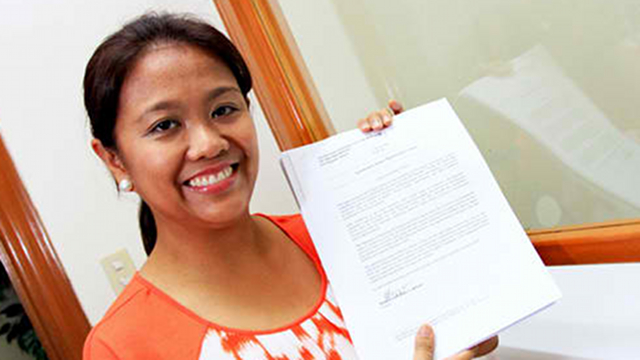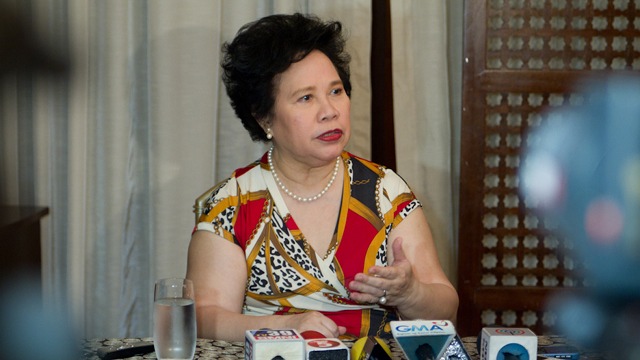SUMMARY
This is AI generated summarization, which may have errors. For context, always refer to the full article.

MANILA, Philippines – Recognizing the web’s double-edged power, senators Nancy Binay and Miriam Defensor-Santiago filed separate bills on Internet policy.
Binay filed the Electronic Violence Against Women (E-VAW) bill, while Santiago re-filed her proposed Magna Carta for Philippine Internet Freedom.
In a statement on Wednesday, July 3, Binay said her bill aims to regulate “the exploitative and irresponsible use of social media that has become a mode of disseminating scandals involving both television personalities and private individuals.”
READ: The e-violence bill: adding digital protection
The daughter of Vice President Jejomar Binay said the measure aims to protect victims of online violence from “further harm” against perpetrators who are their close or distant relatives, a former spouse or partner, or an ex-boyfriend or ex-girlfriend.
She cited online bullying, cyberstalking, and other forms of digital harassment that people close to the victims may carry out.
“Being bullied or harassed by a known perpetrator, or someone close to you, has a serious emotional and psychological impact than being hassled by a stranger. Mas masakit sa mga biktima kung kakilala nila ang gumagawa ng mga panliligalig sa kanila,” Binay said. (It is more painful for the victims when the one bothering them is known to them.)
Under Binay’s bill, electronic violence is defined as “any act involving the exploitation of data that can cause or is likely to cause mental, emotional and psychological distress or suffering to the victim.”
The senator identified the following as possible forms of electronic violence:
- unauthorized recording, reproduction, or distribution of videos showing the victim’s private areas;
- uploading or sharing any form of media with sensitive and indecent content without the victim’s content;
- harassment through text messaging;
- electronic or any other multimedia means;
- cyberstalking including the hacking of personal accounts on social networking sites and the use of location trackers on cellular devices;
- unauthorized use of the victim’s identity (pictures, video, voice, name) for distribution that can harm the victim’s reputation;
Binay’s bill punishes any act causing electronic violence against a woman and her child with 6 months to 6 years imprisonment, and “threats causing electronic violence” with a jail term of one month to 6 months.
Those violating the law can also be penalized up to P300,000 but not more than P500,000 “depending on the gravity of distress caused to the victim.”
The bill also provides a protection order for the woman and her child.
Nancy Binay: It’s not for my critics
Binay’s bill aims to amend and expand the provisions of the Violence Against Women and Children Act (VAWC) of 2004 or Republic Act 9262.
“Although the VAWC Law already protects women and children against physical, sexual, emotional, economic, and psychological abuses, it does not include other forms of digital harassment like cyberbullying,” said Binay.
“Since the enactment of the [law], women and their children have been provided with additional alternatives and protection against abusive conduct and violence. However, the law has not taken into consideration the prevalent and widespread reach of the Internet and communication technology,” she added.
Binay added that the Anti-Photo and Video Voyeurism Act of 2009 (RA 9995) failed to address online violence committed by assailants with “special relationships” with the victims.
In an interview with reporters Wednesday, Binay clarified that the bill was not meant to get back at her campaign critics.
“This bill is not about what I experienced during the campaign because under the bill, to qualify for that, you have to have a personal relationship with the perpetrator. I don’t have any personal relationship with Vice Ganda so this is not about me,” Binay said.
“It saddens me that they are attacking me again that I am trying to suppress freedom. This is another protection for women. You’ve seen those posting sex videos. This is their protection so they can have a way to seek redress.”
During the campaign, Binay said she became a victim of cyberbullying. She was the subject of criticism on social networking sites with netizens questioning her inexperience, refusal to join debates and even her skin color.
In a previous interview with Rappler, Binay said Internet regulation was one of the issues she planned to focus on.
“How do we balance regulation and freedom of speech? It’s something we need to talk about in the Senate,” she said.

Miriam to netizens: Support Magna Carta
While Binay focused on online violence, Santiago’s bill aims to establish a framework for information and communication technology (ICT) in the Philippines.
Santiago refiled the Magna Carta for Philippine Internet Freedom for the 16th Congress, a measure she first filed in November 2012 and called “the anti-cybercrime law version 2.0.”
In a statement Wednesday, Santiago said, “While it is important to crackdown on criminal activities on the internet, protecting constitutional rights like free expression, privacy, and due process should hold a higher place in crafting laws.”
She added, “The MCPIF treats libel as a civil liability rather than a criminal act. It is not overbroad or vague in its provisions on libel, unlike the cybercrime law.”
In the explanatory note of her refiled measure, Santiago said it is time for both the government and the private sector to come up with an ICT framework.
“Unless this framework is set in place, the temptation looms that the challenges engendered by these new technologies will be addressed in a reactionary, irrational, and haphazard manner that ultimately impedes national progress,” Santiago said.
“This bill provides for appropriate mechanisms and command structures within the government to address ICT-enabled threats and promote online access and social benefits.”
Santiago cited the power of the Internet in promoting culture, education, government transparency, and especially in disaster management.
In particular, she said @dost_pagasa, @MMDA, and Project Noah show that communication through the Internet and social media is the hallmark of public service.
“The Magna Carta for Philippine Internet Freedom is envisioned to ensure that the Philippines and its citizens are able to meet the challenges posed by ICT and cyberspace, able to wield it and benefit from it in charting a better future.”
Santiago said that while laws like the Electronic Commerce Act and Data Privacy Act have been crafted, there remains a need for better laws on Internet policy.
“Unfortunately, there remains legislation that confines the Philippines to 20th century capabilities in this 21st century information society. Clearly, laws that have an impact on cyberspace must address the realities of the present and the challenges of the future.”
“I call on all our young people to voice their support for this bill through social media. You are our new opinion-leaders. After the RH Bill, we saw how powerful social media can be in advancing our causes,” Santiago said.
Santiago filed the bill to repeal the Cybercrime Prevention Act of 2012, which netizens and human rights groups questioned before the Supreme Court for violating freedom of expression and freedom of speech.
Sen Bongbong Marcos also filed a related measure, seeking to lower the penalty for online libel in the controversial law.
The high court has indefinitely stopped the implementation of the anti-cybercrime law and has yet to rule on its constitutionality.
Read Santiago’s bill here:
The Magna Carta for Philippine Internet Freedom v 2.0
– Rappler.com
Add a comment
How does this make you feel?
There are no comments yet. Add your comment to start the conversation.